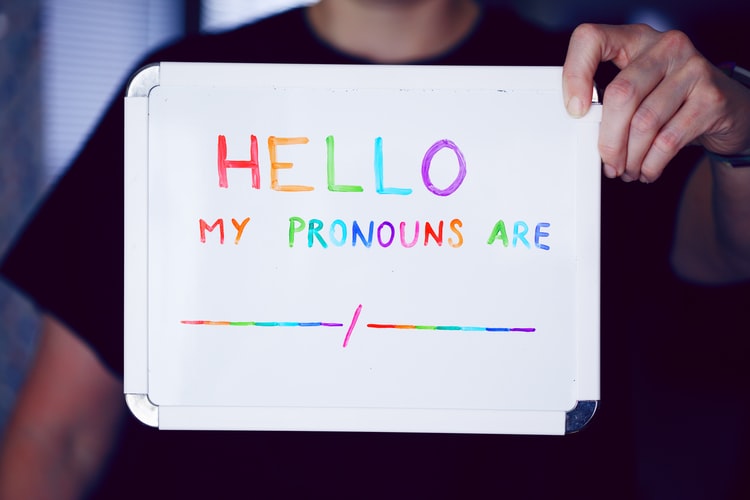Inclusion Audits Can Help Make Workplaces Safer for Non-Binary Employees

Written by: Anuska Roy
Workplaces in India find themselves placed in a limbo of ignorance and apathy when it comes to making workspaces safer for non-binary employees. Non-binary folks have trouble feeling comfortable in their own workplaces. This complication arises due to multiple reasons. Moreover, workplace policies are incapable of taking into account gendered experiences that do not fall under the binary of male and female. From forms to terminology to official language on paper – workplaces are still stuck with regressive language usage which show up in policy implementations as well. A proactive redressal and inclusion audit mechanism for non-binary employees can help solve the existing gap that exists when it comes to building safe spaces for them.
Who are non-binary individuals and How Can Inclusion Audits Help Them?
Non-binary individuals are those who do not identify with the binaries of man and woman. Their gender falls within a vast spectrum. Furthermore, for non-binary individuals, their gender identity as well as gender expression is transgressional. They do not adhere to archaic modules of binaried existences. Consequently, their gender identity and expression lead to transgressions from heteronormative structures. Hence, their gender identity or expression is not limited to the assumed categories of man and woman.
For workplaces, an inclusion audit is an essential factor towards building safer spaces for non-binary employees. An inclusion audit not only provides a larger space for information dissemination, but also creates a safer space for feedback as well as measures lived experiences of inclusivity at workplaces. Non-binary folks often face erasure when it comes to policy implementation at workplaces. Hence, inclusion audits ensure a safe space for representation as well as removes appropriation for non-binary employees at workplaces.
What is an Inclusion Audit?
An inclusion audit is a way for HR professionals to better understand how their employees have experienced diversity and inclusion policies at workplaces. At the heart of it, diversity and inclusion at workplaces must focus on identifying biases and working towards eliminating them. An ideal workspace that identifies these biases and prejudices is also one that is proactively listening to their employees. Consequently, workplaces then must have mechanisms in place that help them build conversations around these issues.
Inclusion audits not only help HR professionals learn from their employees but also places authority within the hands of employees. Moreover, inclusion audits also help marginalised groups within workplaces voice their concerns. This creates a positive and healthy chain of communication that goes a long way in building strategies for marginalised groups within workplaces.
Workplace Policies to Aid Non-Binary Employees
While the larger conversation around making workplaces more inclusive for non-binary employees require a deeper look into existing gaps and interventions – some policies that can otherwise make workspaces safer for them are:
Using Gender Neutral Terminology
Workplace culture often focuses on using binaried terms in official paperwork as well as informal conversations. Using terminology that is inclusive of all genders is an integral step towards creating a more diverse and inclusive workforce. Gendered terms in policies such as maternal leave can be replaced by terms such as parental leave. Moreover, normalising usage of pronouns in internal as well as external communication helps create a safer space for non-binary employees.
Having Non-Binary Employees in Active Policy Making Decisions
It is important to place non-binary employees within structures that focus on policy research and implementation. Having non-binary employees within advisory councils and boards is another way to ensure that their voices are being heard. Moreover, placing non-binary individuals in policy making mechanism or advisories is essential to ensure representation as well as to avoid appropriating their space.
Building Support Groups
Support groups are important to help non-binary individuals find their safe space especially for those who are fresh joiners for any workplace. Building support groups for non-binary individuals can aid in helping them feel welcome and safe in their space of work. Support groups are not only an important part of building integral solidarities within workplaces but also act as important spaces where people can rely on for support when it comes to redressals.
Gender Neutral Language Usage
Being mindful of language usage as well as information dissemination is important. Invasive questions related to their gender identity or bodily functions must be penalised to set up safe spaces for them. Non-binary employees must feel safe to access common spaces at their workplace and uncomfortable questions be colleagues or supervisors can hinder the same.
Gender Neutral Spaces
A workplace that works towards ungendering these essential spaces is able to make their workplace safe for non-binary employees. Gender neutral washrooms at workplaces are a basic start to making non-binary individuals feel safe. Normalizing the usage of pronouns in internal as well as external communications is another integral part of building safe spaces for non-binary persons.
How can Inclusion Audits Aid Non-Binary Employees at Work?
Inclusion audits are a great way to avoid any risk of appropriation. Non-binary employees can put forward their requirements and grievances. Consequently, this helps professionals understand critical junctures that need immediate address. Moreover, this also helps professionals chalk out a constructive plan of action that would entail a more inclusive outlook towards workplace policies. With inclusion audits workplaces can have a quantitative outlook on how their workplace culture is currently functioning as well as what needs to be revised moving forward.
Ungender Insights is the product of our learning from advisory work at Ungender. Our team specializes in advising workplaces on workplace diversity and inclusion. Write to us at contact@ungender.in to understand how we can partner with your organization to build a more inclusive workplace.
Read our insights about diversity, legal updates and industry knowledge on workplace inclusion at Ungender Insights. Visit our Blog.
Sign up to stay up-to-date with our free e-mail newsletter.
The above insights are a product of our learning from our advisory work at Ungender. Our Team specialises in advising workplaces on gender centric laws.
or email us at contact@ungender.in




